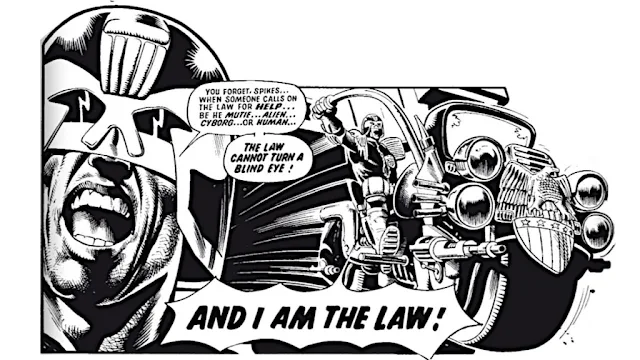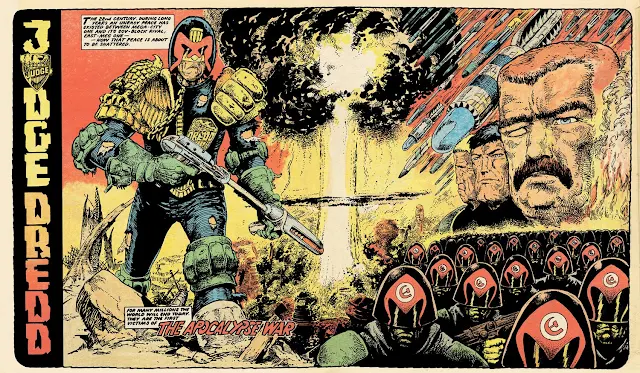The series' use of allegory is both subtle and powerful, allowing readers to engage with these ideas on a deeper level and to draw connections between the fictional world of Mega-City One and the real-world political landscape.
The Judge Dredd comics series also tackles issues such as corruption, inequality, and the dangers of unchecked power. These allegories are woven seamlessly into the fabric of the series, allowing readers to engage with these ideas without feeling as though they are being hit over the head with a political message.
The portrayal of Mega-City One as a fascist state in the Judge Dredd comics is a powerful and thought-provoking allegory. By depicting the Judges as all-powerful enforcers who can arrest, convict, and execute anyone they deem to be a criminal, the series explores the dangers of authoritarianism and the need for checks and balances in government institutions. The Judges' emphasis on law and order at the expense of individual rights and freedoms echoes the fascist regimes of the past, which sought to impose their will on the population through force and coercion.
The example of The Cursed Earth storyline is particularly interesting, as it explores the issue of prejudice and discrimination through the lens of the mutant population. The mutants are portrayed as outcasts and pariahs in Mega-City One, feared and despised by the human population. The Judges' persecution of the mutants highlights the dangers of prejudice and the need for tolerance and acceptance, while also drawing a parallel to real-world issues such as racism and xenophobia.
The portrayal of the Justice Department as a corrupt and oppressive institution is another powerful example of political allegory in the Judge Dredd comics. The Pit storyline explores the issue of corruption and the dangers of unchecked power, as the Judges' housing block becomes a hotbed of crime and corruption. The series highlights the importance of accountability and transparency in government institutions, and the need for those in power to be held to account for their actions.
The portrayal of environmental issues in the Judge Dredd comics is an allegory that is particularly relevant today. The Origins storyline explores the origins of Mega-City One and how it became a polluted wasteland, highlighting the dangers of environmental degradation and the need for sustainable development. The series draws attention to the role that corporate greed and government inaction play in exacerbating these problems, and the need for a concerted effort to address them.
The Apocalypse War storyline is a powerful example of political allegory in the Judge Dredd comics. The story depicts a devastating nuclear war between Mega-City One and East-Meg One, which nearly wipes out both cities. The allegory here is a warning about the dangers of nuclear weapons and the devastating consequences of war. By portraying the war as a brutal and destructive conflict, the series highlights the need for diplomacy and cooperation to prevent such conflicts from occurring in the real world.
The Necropolis storyline is another powerful example of political allegory in the Judge Dredd comics. In this story, the Dark Judges invade Mega-City One with the intent of imposing their own twisted brand of justice on the population. The allegory here is a critique of authoritarianism and the dangers of unchecked power. The Dark Judges represent a corrupt and oppressive regime, one that seeks to impose its will on the population through force and coercion. The story highlights the importance of individual rights and freedoms, and the need for government institutions to be held accountable for their actions.
The Origins II storyline explores the origins of the Judge system, revealing that it was created as a response to civil unrest and political upheaval. The allegory here is a commentary on the dangers of authoritarianism and the need for balance between security and individual rights. The Judges were created to maintain order and stability, but their powers are often used to suppress dissent and impose the will of the state on the population. The story highlights the importance of checks and balances in government institutions, and the need for a balance between security and individual rights.
As Judge Dredd himself famously stated in the comic,
The Judge Dredd comics series also tackles issues such as corruption, inequality, and the dangers of unchecked power. These allegories are woven seamlessly into the fabric of the series, allowing readers to engage with these ideas without feeling as though they are being hit over the head with a political message.
Mega-City One as a Fascist State
The portrayal of Mega-City One as a fascist state in the Judge Dredd comics is a powerful and thought-provoking allegory. By depicting the Judges as all-powerful enforcers who can arrest, convict, and execute anyone they deem to be a criminal, the series explores the dangers of authoritarianism and the need for checks and balances in government institutions. The Judges' emphasis on law and order at the expense of individual rights and freedoms echoes the fascist regimes of the past, which sought to impose their will on the population through force and coercion.
Mutants as a substitute for any other discriminated group
The example of The Cursed Earth storyline is particularly interesting, as it explores the issue of prejudice and discrimination through the lens of the mutant population. The mutants are portrayed as outcasts and pariahs in Mega-City One, feared and despised by the human population. The Judges' persecution of the mutants highlights the dangers of prejudice and the need for tolerance and acceptance, while also drawing a parallel to real-world issues such as racism and xenophobia.
An oppressive State
The portrayal of the Justice Department as a corrupt and oppressive institution is another powerful example of political allegory in the Judge Dredd comics. The Pit storyline explores the issue of corruption and the dangers of unchecked power, as the Judges' housing block becomes a hotbed of crime and corruption. The series highlights the importance of accountability and transparency in government institutions, and the need for those in power to be held to account for their actions.
Keep it green
The portrayal of environmental issues in the Judge Dredd comics is an allegory that is particularly relevant today. The Origins storyline explores the origins of Mega-City One and how it became a polluted wasteland, highlighting the dangers of environmental degradation and the need for sustainable development. The series draws attention to the role that corporate greed and government inaction play in exacerbating these problems, and the need for a concerted effort to address them.
Dredd story arcs that feature political allegory
The Apocalypse War storyline is a powerful example of political allegory in the Judge Dredd comics. The story depicts a devastating nuclear war between Mega-City One and East-Meg One, which nearly wipes out both cities. The allegory here is a warning about the dangers of nuclear weapons and the devastating consequences of war. By portraying the war as a brutal and destructive conflict, the series highlights the need for diplomacy and cooperation to prevent such conflicts from occurring in the real world.
The Necropolis storyline is another powerful example of political allegory in the Judge Dredd comics. In this story, the Dark Judges invade Mega-City One with the intent of imposing their own twisted brand of justice on the population. The allegory here is a critique of authoritarianism and the dangers of unchecked power. The Dark Judges represent a corrupt and oppressive regime, one that seeks to impose its will on the population through force and coercion. The story highlights the importance of individual rights and freedoms, and the need for government institutions to be held accountable for their actions.
The Origins II storyline explores the origins of the Judge system, revealing that it was created as a response to civil unrest and political upheaval. The allegory here is a commentary on the dangers of authoritarianism and the need for balance between security and individual rights. The Judges were created to maintain order and stability, but their powers are often used to suppress dissent and impose the will of the state on the population. The story highlights the importance of checks and balances in government institutions, and the need for a balance between security and individual rights.
In conclusion, the use of political allegory in the Judge Dredd comics is a powerful tool for exploring complex political issues and drawing attention to real-world problems. The series uses metaphorical representations to highlight the dangers of authoritarianism, corruption, and unchecked power, while also commenting on issues such as nuclear weapons, war, and civil unrest. These allegories challenge readers to think critically about the world around them and to consider the consequences of their actions.
As Judge Dredd himself famously stated in the comic,
"I am the law."
This quote is a perfect example of the political allegory in the Judge Dredd comics, as it highlights the dangers of giving too much power to a single individual or institution. By exploring these themes in a fictional setting, the comics offer a thought-provoking commentary on real-world political issues, challenging readers to consider the importance of individual rights and freedoms, the need for checks and balances in government institutions, and the consequences of war and nuclear weapons.
Overall, the political allegory in the Judge Dredd comics serves as a powerful reminder of the dangers of authoritarianism and the importance of accountability, transparency, and individual rights. Through these stories, the comics challenge readers to think critically about the world around them and to consider their role in shaping a more just and equitable society.
Overall, the political allegory in the Judge Dredd comics serves as a powerful reminder of the dangers of authoritarianism and the importance of accountability, transparency, and individual rights. Through these stories, the comics challenge readers to think critically about the world around them and to consider their role in shaping a more just and equitable society.

















